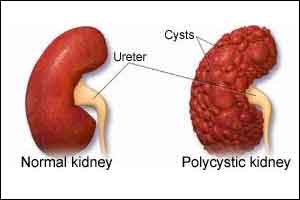- Home
- Editorial
- News
- Practice Guidelines
- Anesthesiology Guidelines
- Cancer Guidelines
- Cardiac Sciences Guidelines
- Critical Care Guidelines
- Dentistry Guidelines
- Dermatology Guidelines
- Diabetes and Endo Guidelines
- Diagnostics Guidelines
- ENT Guidelines
- Featured Practice Guidelines
- Gastroenterology Guidelines
- Geriatrics Guidelines
- Medicine Guidelines
- Nephrology Guidelines
- Neurosciences Guidelines
- Obs and Gynae Guidelines
- Ophthalmology Guidelines
- Orthopaedics Guidelines
- Paediatrics Guidelines
- Psychiatry Guidelines
- Pulmonology Guidelines
- Radiology Guidelines
- Surgery Guidelines
- Urology Guidelines
Tolvaptan slows kidney function decline in Polycystic kidney disease

A phase 3 trial studying the effects of tolvaptan has found that the drug slowed the rate of decline in kidney function in patients with the most common form of polycystic kidney disease, a condition with no cure. The results are published today in the New England Journal of Medicine.
Autosomal dominant polycystic kidney disease is an inherited condition that affects 1 in every 500 to 1,000 individuals in the U.S. This disease is found in all races and sexes.
Autosomal dominant polycystic kidney disease, which is the fourth most common cause of end-stage kidney disease, requires dialysis or a kidney transplant.
The disease causes a slow but relentless growth of cysts that damage the kidneys. In addition to negatively affecting the quality of life, the condition also causes hypertension and painful complications. The cysts, which can damage kidneys with their size, can develop in other organs, especially the liver.
Approximately half of individuals with autosomal dominant polycystic kidney disease eventually will require dialysis or kidney transplant by age 60. The results of the trial demonstrated tolvaptan's ability to intervene in a way that slows kidney function decline in this population.
"This is the first treatment that targets a mechanism that directly contributes to the development and growth of the kidney cysts in autosomal dominant polycystic kidney disease," says Vicente Torres, M.D., Ph.D., director of Mayo Clinic's Translational Polycystic Kidney Disease Center. "This in effect means it may delay the need for a kidney transplant or dialysis in patients with this disease."
As lead investigator of the trial, Dr. Torres is available for media interviews to discuss these findings and their significance for those facing autosomal dominant polycystic kidney disease.

Disclaimer: This site is primarily intended for healthcare professionals. Any content/information on this website does not replace the advice of medical and/or health professionals and should not be construed as medical/diagnostic advice/endorsement or prescription. Use of this site is subject to our terms of use, privacy policy, advertisement policy. © 2020 Minerva Medical Treatment Pvt Ltd